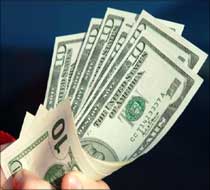The 'dirty money' myth seems to have finally been dispelled, after a new study has revealed that banknotes don't pick up enough bacteria to be dangerous.
 For the study, an international team, led by Ballarat University, has analysed banknotes from at least ten nations and found these are not contaminated with dangerous levels of bacteria, the 'Foodborne Pathogens and Disease' journal said.
For the study, an international team, led by Ballarat University, has analysed banknotes from at least ten nations and found these are not contaminated with dangerous levels of bacteria, the 'Foodborne Pathogens and Disease' journal said.
Lead researcher Dr Frank Vriesekoop said: "The richer and more developed countries had fewer bacteria on their money than poorer countries."
Importantly, nowhere in the world were alarming levels of pathogenic bacteria found on money. We also found the age of the banknotes, and the material of which they are made will affect the extend of contamination of that money."
The international study included researchers from ten universities and research institutes.
A total of 1280 currency notes were collected from food outlets such as foodshops and cafeterias and screened to ascertain the presence of bacteria.
The countries where the research was conducted include Australia, Burkina Faso, China, Ireland, Mexico, Netherlands, New Zealand, Nigeria, the UK and the US.
"The older notes are more wrinkled, so that dirt and bacteria can easily nestle in the folds of the notes."
The material the banknotes are made of was also found to be important. In most countries banknotes are made from a cotton based material; while in Australia, New Zealand, and Mexico the banknotes are made from a polymer material.
"We found that notes made from polymer material carried significantly less bacteria compared to the notes based on cotton," Dr Vriesekoop said.
In addition, the researchers have found a strong correlation between the number of bacteria per square centimetre of banknote, and a number of indicators of economic wealth in the different countries.
As a country scores lower on the "index of economic freedom", the more bacteria were found on the banknotes in circulation.
The index incorporates business freedom, trade freedom, monetary freedom, financial freedom, freedom from too much government interference, and absence of corruption.
"It is also likely that in a country that scores low on this index, the banknotes might be older than in countries with a higher score. We found very low levels of pathogenic bacteria in any of the banknotes, and never in alarming numbers," Dr Vriesekoop said.
However, the researchers have still recommended that in food outlets the handling of food and the collection and exchange of money be physically separated, preferably undertaken by different people.




